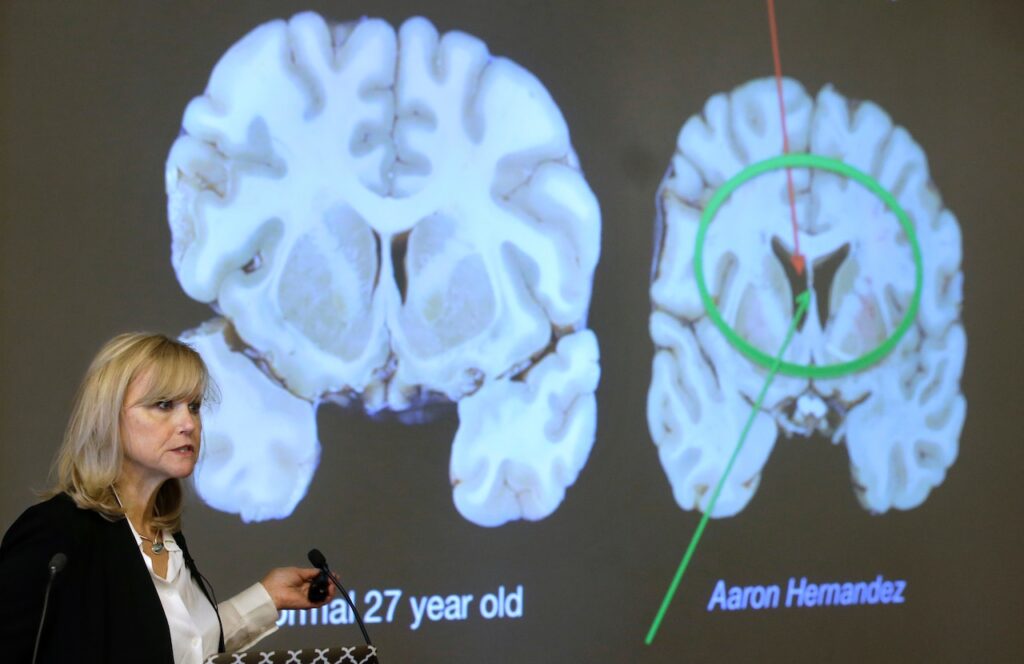For people in high-impact sports, like football and hockey players, and even military service members, repeated blows to the head can cause a range of issues, from memory loss to impulse control issues.
While family members and doctors can sometimes surmise that it is chronic traumatic encephalopathy, also known as CTE, it cannot be diagnosed until the individual dies, through examining the brain.
Boston University’s CTE Center is trying to change that with a new study funded by a $15 million grant from the National Institutes of Health.
“[CTE] has the potential to be a major public health concern,” Mike Alosco, the co-director of clinical research at BU‘s CTE Center, told MassLive.
CTE is a progressive brain disease that is characterized by abnormal accumulation of a protein in the brain, which gathers and leads to the destruction of cells and tissue, leading to behavioral and cognitive issues, Alosco said.
Aaron Hernandez, former New England Patriots star and convicted murderer, was famously diagnosed by Boston University with CTE following his suicide in Shirley’s Souza-Baranowski Correctional Center in April 2017.
The study aims to detect and diagnose CTE during life, better understand the symptoms of CTE, who is at risk and ways to intervene through brain and blood imaging, Alosco said. It also aims to differentiate CTE and Alzheimer’s disease, which can have similar symptoms.
“We need to be able to accurately detect it and diagnose it during life so that we can ultimately start to study treatments and conduct treatment trials, and because that’s really the ultimate goal is how do we treat this? How do we stop this?” Alosco said.
Read more: An undocumented student’s story: Why it’s hard to be here no matter who is president
The announcement of the $15 million grant comes after the National Institutes of Health terminated hundreds of grants worth billions of dollars. The number hasn’t been confirmed with the Senate Health, Education, Labor and Pensions Committee’s minority staff report stating over $2.7 billion, while other estimates ballpark it at $1.8 billion.
The National Science Foundation has similarly canceled grants abruptly due to President Donald Trump’s orders to end support of research on diversity, equity and inclusion, as well as the study of misinformation, according to the Associated Press.
The two federal agencies have also announced they would cut the rate of reimbursement to higher education institutions for “indirect costs” or overhead costs for institutions that receive grants to 15% — leading to lawsuits.
Boston University’s ‘brain bank’
Since 2008, when the Boston University CTE first opened, the institution has collected over 1,600 brains and tissue samples through its “brain bank” of donated brains, spinal cords and eyes from across the country, according to Alosco.
It is the largest tissue repository in the world focused on traumatic brain injury and CTE. Of those, over 800 have been diagnosed with CTE, according to the website.
“BU has really been at the forefront of describing this disease and what it looks like in the brain tissue,” Alosco said.
Boston University is leading the study in collaboration with the University of California, San Francisco, the Mayo Clinic in Arizona and Banner Alzheimer’s Institute, the University of Florida and the University of Texas San Antonio, Alosco said.
The new study builds upon a preliminary study, which was funded by NIH and began in 2015 and ended in 2023, Alosco said. It found that the biomarkers used to diagnose Alzheimer’s disease don’t work well to detect CTE.
Biomarkers are biological molecules that indicate the presence of something, like a disease, in someone — sometimes even before symptoms are apparent.
Some of the people who participated in the first study will continue into its second iteration.
The study will have 350 male participants, 55 years old or older. Of those participants, 225 will be former college or professional football players, 50 will be people with Alzheimer’s disease and there will be 75 controls.
“We’re just extremely grateful to be in this position to carry forward this study and research,” Alosco said.
“We just hope to grow this as we move forward down the road, 10, 20 years and make it bigger and bigger with more sites so that everyone has access to care, research and resources who needs it,” he said.
Those interested in taking part in the study can read more here to determine eligibility.


